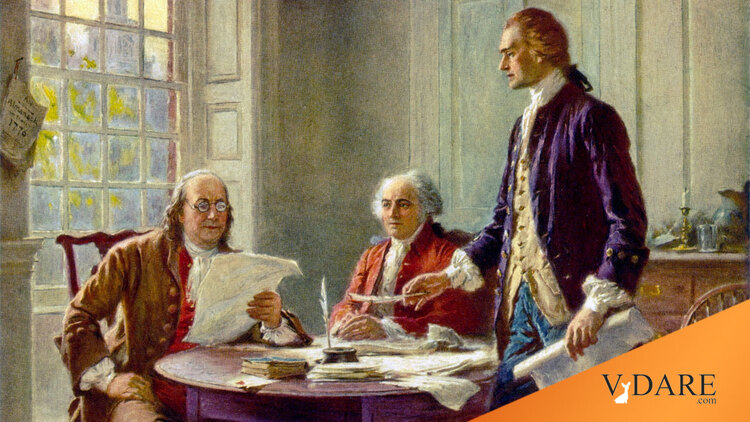
03/22/2001
Webzine enthusiasts like ourselves were greatly heartened by The Wall Street Journal’s farsighted decision last year to make an expanded version of the Editorial Page available free. Because the WSJ has one of the very few successful subscription websites, the move clearly constituted recognition by the influence-hungry Edit Page that opinion-formation is migrating from traditional media to the internet. Which is our opinion too.
Advantages of the webzine include no space constraint on writers or on correspondents. Worthwhile items no longer have to be missed out for lack of space.
But WSJ has other motives, apparently. Recently, OpinionJournal carried a refreshing celebration of the Founding Fathers by Seth Lipsky — refreshing because the intellectual school now dominant on the page frequently seems to believe America was born, or diagrammed by some econometrician, yesterday.
However, the essay did contain the following absurdity:
"In its Autumn 1999 issue, City Journal published a wonderful article called "Why the Founding Is Back in Fashion," in which Jean M. Yarborough and Richard E. Morgan remind us that America has no "biological fathers to provide an ethnic basis" for its nationality. "For us, the Founding Fathers and their ideals must do the work," they wrote."[Mad About Madison, March 14, 2001]
Our friend Nathaniel Parker was provoked to reply. Those familiar with e.g. the Edit Page’s suppression of the 1997 NAS report on immigration’s dismaying economics, will not be surprised to learn his perfectly valid comment, documented brilliantly at length in Albion’s Seed, never appeared. The article went off into the archives this week trailing four syrupy responses, none touching on this question.
Why would OpinionJournal, freed of space constraints, not want to carry this point of view? Evidently its appreciation for the heritage of the Founders does not extend to the English tradition of not proscribing political comment. OpinionJournal looks likely to follow the Editorial Page tradition of taboo-laden closed-mindedness.
Nathaniel Parker’s response:
Mr. Lipsky is wrong, as his City Journal sources are wrong, to assert that America has no "biological fathers to provide an ethnic basis" for our nationality. A look at the Founding Fathers themselves dispels that myth. They were not deracinated lawgivers who appeared ex nihilo to create a new synthetic state in a largely empty continent; certainly they did not see themselves that way. They were representatives of the propertied class of Great Britain’s former North American colonies. The vast majority were members of families already long established in America, many for over 150 years by the time of the Constitutional Convention. They were overwhelmingly of British descent, the substantial majority of English descent. The very few delegates who were not American born were all British born. The colonies-become-states whence they came were English settlements, already long enough established to have given rise to a distinct (Anglo-)American people: the people who fought for and, with French help, won independence for the thirteen colonies. The United States that they formed of their newly independent states was thoroughly English in culture, law, tradition and religion. In scholarly invocations of natural law and assorted Enlightenment philosophers, the most important influence on the Constitution (and the Declaration of Independence) tends to get lost. The Founders' understanding of law and its application to free men owed more to the English Common Law, as it had developed by their day and as they applied it in America, than to any other source.
Already by 1776, an American nation had evolved, as nations will, in the Thirteen Colonies of British North America. The Founders were members of that distinct, ethnically British, nation, as they well knew and often said. The Founding Fathers and their fellow Americans of 1776 are the biological fathers of scores of millions of today’s Americans. One of the extraordinary things about the United States of America is the relative ease with which it has absorbed immigrants since independence. To claim, presumably for that reason, that the American nation has no original ethnic basis of its own is, however, nonsense.
Seth Lipsky is right to celebrate a recent increased appreciation of the Founding Fathers and all that they did to establish a sound framework for independent American government. It is disgraceful that succeeding generations of Congressmen, presidents and federal judges have played so fast and loose with our constitutional inheritance that federalism and the separation of powers are alien concepts to too many Americans. Perhaps that renewed appreciation will spark an actual reapplication of the Constitution to American government. I hope so.
March 22, 2001
This is a content archive of VDARE.com, which Letitia James forced off of the Internet using lawfare.